Regan Smith: The Triumphs, Setbacks, Pressures and Emotions of Her First Olympics
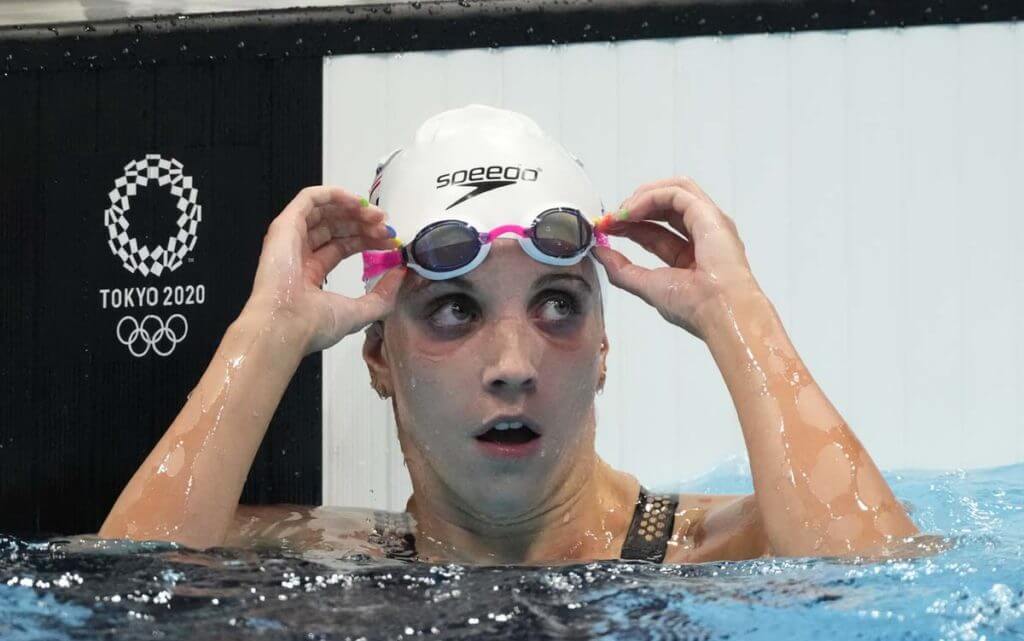
Editorial content for the 2021 Tokyo Olympic Games coverage is sponsored by GMX7.
See full event coverage. Follow GMX7 on Instagram at @GMX7training #gmx7

Regan Smith: The Triumphs, Setbacks, Pressures and Emotions of Her First Olympics
On the morning of August 27 in Tokyo, Regan Smith won her first Olympic medal, a bronze in the women’s 100 backstroke. The only swimmers to beat her were Australia’s Kaylee McKeown, the world-record holder, and Canada’s Kylie Masse, the two-time world champion in the event, and Smith’s time of 58.05 was faster than any previous winning time at an Olympics or World Championships. But Smith did not see this as a triumph, an amazing accomplishment to be proud of. Instead, she could not shake her disappointment after a race that Smith had spent years pointing toward as she shot up U.S. and global backstroke rankings
“I just remember being on the podium and not being able to appreciate what I was doing in that moment,” Smith said. “I just wish I had taken in that moment more. It’s just such a bummer, just because winning a bronze medal is something to be extremely proud of, and I’m extremely proud of it now. I can say that, truly. But in the moment, there’s definitely some disappointment.”
Smith was only two years removed from an amazing 2019 World Championships where she smashed world records in both the 100 back and 200 back, but while she entered the original Olympic year (2020) riding an enormous wave of momentum, the one-year delay due to the COVID-19 pandemic derailed her momentum. Waiting almost two years between major racing opportunities, the 19-year-old Smith was feeling significant pressure in the months leading up to the U.S. Olympic Trials, and her backstroke fell into a funk. She had overcome significant self-doubt and frustration to win the 100 back at U.S. Trials, but around the same time, she lost her world record in the event to McKeown.
Then in Tokyo, the weight of expectations, partially external but even more so internal, made the bronze medal feel like a loss.
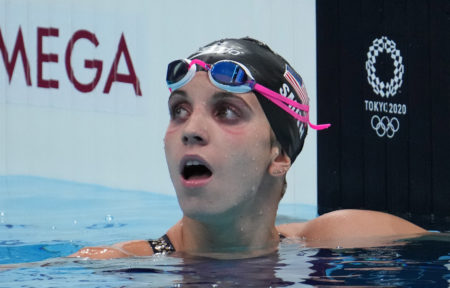
Regan Smith after winning bronze in the 100 back at the Tokyo Olympics — Photo Courtesy: Robert Hanashiro/USA Today Sports
“After Trials, I was over the moon and I really thought that would be the end of my stress for a very long time,” Smith said. “I was really feeling that way all of July. And then once we got to Tokyo and the Games were beginning, I was like, ‘Oh crap.’ And then it felt like Trials all over again. It was a lot of stress, a lot of nerves. I really worked hard to not feel those external expectations that were on me, but it’s kind of impossible to not feel those.”
Contrast that with Smith’s emotions two days later, when she earned her second individual Olympic medal in the women’s 200 butterfly. While she had been the world-record holder in both backstroke events prior to the pandemic, the 200 fly was a newer event for her, a “total fun one,” she said. The pressure of following up world record performances simply did not exist in this race.
Smith was seen as a medal contender, and after qualifying fourth for the final, she turned in third place at 150 meters. But then she closed in 32.10, the quickest last split in the field, and fought her way to a silver medal. The time was 2:05.30, Smith’s lifetime best by more than a second and good enough to make her the second-fastest American in history.
When Smith saw this scoreboard showing her time and place, her mouth hung open in shock, a far cry from the disappointment evident in her face after the 100 back.
“I just did not think I could do that,” Smith said. “I don’t know if that’s just me not being confident in myself or what, or just not knowing what I’m capable of, but I did not think I was going to drop a second, just because that’s something I hadn’t done since Worlds probably. I feel like I hadn’t smiled like that after a race in forever, so that was just really, really nice.”
Smith called that 200 fly Olympic final “one of my favorite races of all time,” and that moment reminded her: that’s what swimming should feel like all the time, full of joy and excitement rather than pressure and stress. Smith thought to herself, “Why is this the first time in so long that I feel like I’m having true fun?”
Stress, Pressure and Seeking Balance
On the day in between Smith’s two individual Olympic finals, one of the landmark moments of the Games provided Smith with some clarity and relief.
In gymnastics, superstar Simone Biles withdrew from the team final and left her American teammates to compete without her. Biles was not physically hurt, but she choose to prioritize her mental health, thanks to a phenomenon called the “twisties,” a mental block that developed and prevented her from completing her routines as she wanted.
Beyond that, Biles was feeling the strain of intense pressure and expectations heaped upon her as the “greatest of all time” and the face of the Games. Biles called the experience “a long Olympic process… a long year.” According to NPR, Biles said, “I think we’re just a little bit too stressed out” before adding “but we should be out here having fun — and sometimes that’s not the case.”
Sound familiar? For Smith, absolutely. It was a sign that for all of the stress she had felt in the previous few months, she was not alone.
“I think it was a great breath of fresh air to hear that from such an accomplished and incredible athlete,” she said. “It was just a sigh of relief that, ‘Oh my goodness. Literally everyone in this (Olympic) Village is feeling the same way.’”
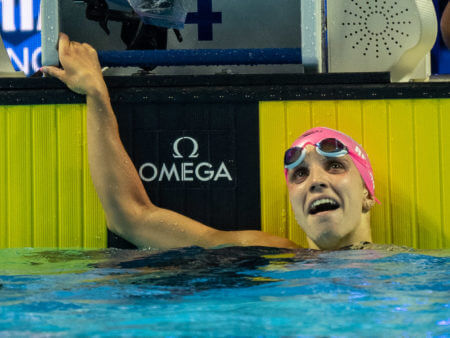
Regan Smith after qualifying for her first Olympic team at the U.S. Olympic Trials — Photo Courtesy: Peter H. Bick
Therefore, Smith took away from her first Olympic Games the supreme importance of keeping that light, fun feeling at the center of her athletic endeavors. She wants to be able to consistently replicate those joyful, lively emotions she experienced after the 200 fly final rather than be weighed down by the stress that affected not only her backstroke but also the enjoyment of the entire Olympic process.
That means finding balance, which Smith admittedly lacked in 2021. Because of the pandemic, she deferred her enrollment at Stanford to stay home in Minnesota to train for the Olympic Trials and Olympics with longtime coach Mike Parratto. She took some online college classes in the fall but devoted the spring exclusively to swimming. She described the experience as “great for me in a lot of ways but not great for me in a lot of ways.” She needed a hobby or an interest some sort of distraction but never found anything sufficient to take her mind away from the pool when it needed to be.
“It ended up working out in the end. I made the team, I got some medals, but I think swimming consumed me for a little bit, and it became all who I was,” Smith said. “The balance is extremely important. You can say it’s important all you want, but it’s a different thing to actually have balance, and I definitely think I lost that balance during this last semester. And I think all summer, too, it was just consuming me. I just wasn’t the same person that I used to be.”
And Smith admits that it will become an added challenge to maintain that balance and not let swimming consume her now that she is being paid for her accomplishments. Because of NCAA rule changes that allow college athletes to profit off their name, image and likeness (NIL), Smith was able to accept prize money from the Olympics and after the Games, she signed an apparel deal with Speedo. She does not want to let swimming become “about getting the fastest times so that I can make more money off of. That’s not really how I want to view it.”
Smith thinks that could lead her again down the path of extreme pressure and stress and negative mental energy, which she is desperate to avoid. It will be tough to maintain the positive mindset, “but I think it will be something I really have to prioritize and work on being conscious of,” she said.
The 200 Backstroke and the Ultimate Silver Lining
Of the entire nine-day Olympic experience, Smith was perhaps most concerned about the women’s 200 backstroke — because she would not be competing. She was the world-record holder, the world champion in 2019 by more than 2.5 seconds, but after a year in which her backstroke never clicked, she faded to third in the event at U.S. Olympic Trials as Rhyan White and Phoebe Bacon swam past her on the last length.
At the end of Olympic Trials, Smith admitted that the disappointment of missing the 200 back “really did taint my Trials experience,” as much as she tried to stay positive about qualifying in two events. In Tokyo, “I was really nervous about watching the 200 back,” Smith admitted.
“I was like, ‘Is it going to be hard for me to watch? Am I going to get FOMO? Am I going to wish I was in that race doing it?’ And I really never thought about it once. I was just cheering for Rhyan and cheering for Phoebe, and it never even crossed my mind. I’m really proud of myself for that because I was super scared that I wouldn’t even be able to watch the race because I’d be so sad about it. But I was so excited, and I was screaming my head off for them the whole time.”
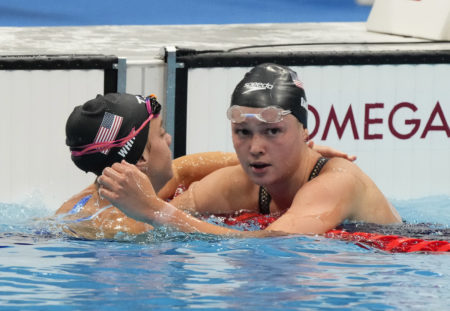
Rhyan White (left) and Phoebe Bacon were the U.S. representatives in the women’s 200 back in Tokyo — Photo Courtesy: Rob Schumacher/USA Today Sports
While she was certainly disappointed to miss out on racing the 200 back at the Olympics, Smith took away one huge positive from the situation: having Bacon qualify for the Olympic team. Smith and Bacon had been competing against each other in the backstroke events for years but never really knew each other very well before the Olympics. The two were among the six U.S. swimmers, all aged 19 or 20, living in a suite together, and Smith said, “I got the biggest kick out of her.”
Smith added, “Everything happens for a reason, and I wouldn’t have it any other way. If I could go back and do things over, I wouldn’t want to happen any other way. I’m so glad that this happened. It really was the ultimate silver lining for that crummy situation for me because she really was so great and I really think that I made a lifelong friend out of her. She’s wonderful.”
An Emotional Tokyo Finale
As Smith was preparing to finish her Olympics by leading off the U.S. women’s 400 medley relay, she noticed right away: she was the only swimmer back from the 2019 world champion medley relay squad that set the world record. Lydia Jacoby had taken over the breaststroke spot from Lilly King, butterflyer Kelsi Dahlia had finished fourth at Olympic Trials in the 100 fly and Simone Manuel had qualified for Tokyo but not in the 100 free. And Smith went from being the youngest on the relay by five years to being the second oldest.
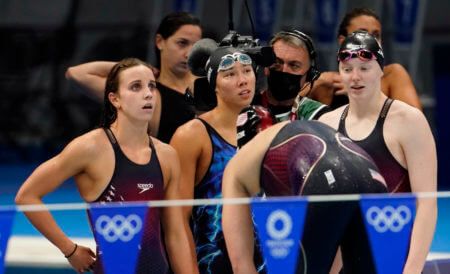
Regan Smith (left), Torri Huske and Lydia Jacoby prepare to embrace Abbey Weitzeil after Weitzeil anchored the U.S. women’s 400 medley relay to a silver medal — Photo Courtesy: Rob Schumacher/USA Today Sports
And for the first time in six years, the Americans did not win gold. Smith touched a close third behind Australia’s McKeown and Canada’s Masse after her leg, and while Jacoby and Torri Huske gave the Americans a lead, it was not enough for Abbey Weitzeil to hold off Australian anchor Cate Campbell. At the end of a hugely successful meet for the Australian women, they had enough to beat the Americans by 0.13 for gold.
Weitzeil split 52.49 on the end, by far the fastest split of her career, but being so close to gold brought heavy emotions out of all the swimmers. Weitzeil climbed out of the pool and fell into Smith’s arms.
“What Abbey said broke my heart because she first got out and said, ‘You guys, I’m sorry.’ After splitting 52.4,” Smith said. “I was like, ‘Abbey, no one should be sorry.”
In that tough moment, Smith was the one telling her teammates, both younger and the older anchor swimmer who hung so tough against Campbell, “we did everything we could. There just wasn’t anything else we could do. I was trying to repeat that over and over because it was hard to come to terms with myself.”
The Olympics and Beyond
Aside from her three Olympic medals, Smith returned from Tokyo with a lifetime of amazing memories, particularly with her five suitemates. Aside from Bacon, the group included University of Virginia swimmers Kate Douglass, Alex Walsh and Emma Weyant as well as Smith’s roommate, 1500 free silver medalist Erica Sullivan. Smith cherishes the memories of the group sitting at the table in their makeshift dining area with folding chairs playing music and playing cards each night “for hours on end.”
And of course, Smith remembers Sullivan’s amazing effort in the 1500. The two had known each other for four years, since the 2017 World Junior Championships, and during the 1500 final, Smith was getting a massage after swimming in the 200 fly semifinals but got up to watch the scoreboard as Sullivan surged past her competitors.
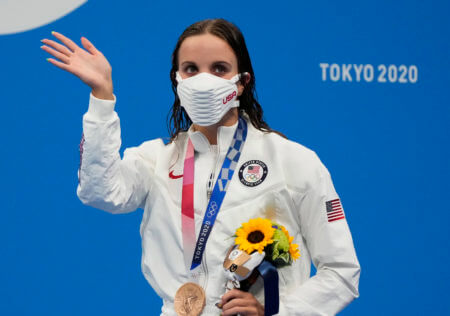
Regan Smith with her 100 back bronze medal, the first Olympic medal of her career — Photo Courtesy: Robert Hanashiro/USA Today Sports
“It was so incredible. I kick myself every day because I wasn’t watching it,” Smith said. “I still just gush when I think about how incredible that race was, and I just wish I had seen it in person. I got to watch the splits in person, real-time, but oh my goodness. Nobody is more deserving than Erica of that medal, that swim, that best time. It gives me chills thinking about it. She is one of the greatest people on this Earth, and I just, holy crap, it was so cool.”
Now, Smith has her college experience to look forward to as she prepares to depart for Stanford in early September. On going to college after the one-year wait, Smith said, “I’m actually so excited. If you asked me a year ago, I’d be terrified. I’d be terrified to leave home and start all this. But I think having that extra year, I’m ready now.”
Once she is at Stanford, she expects to work closely with coach Greg Meehan (who also worked with her during the Olympics) to figure out her backstroke struggles. She thinks the issues are mental, and she is looking forward to possibly working with a sports psychologist to try to get back on track.
“I was very capable of swimming fast backstroke at Trials and at the Games. I haven’t lost anything. I think it’s just something mental that needs to get worked out,” Smith said. “If I think about it too much, I’m like, ‘Oh my gosh, what if it’s lost forever?’ But then thinking rationally, I didn’t just forget how to swim backstroke. I haven’t lost it. I think getting those world records at the time that I did kind of rocked me mentally, and I didn’t really realize it. I think I’m a lot older now, I think I’ve learned a lot from my experiences, and I think I’m ready to get some help mentally and just figure things out. And I’m just excited to get back into the groove of things.”
Since she returned from the Olympics, Smith has enjoyed her break from swimming, but some leftovers from Tokyo “motivate me beyond belief.” First, there’s the young U.S. women’s team that won 18 medals in Tokyo with 10 teenagers on the squad. Smith sees this group’s massive future potential, and she desperately wants to be with this core dominating the international scene for years to come.
“That was the most fun I’ve had in a very long time,” Smith said. “That was probably the most I’ve laughed throughout this entire pandemic, during that trip. It’s just like, ‘Gosh, I never want to miss that again.’ I’m going to remember that every single day when I’m training. I refuse to miss a team. I can’t miss out on that opportunity, to be with these people, competing with these people and wearing USA with these people. It was so special.”
And secondly, she still wants gold. She did bag two silver medals and a bronze from Tokyo to complete the exceptionally challenging Olympic year, but like any Olympic silver or bronze medalist, she has hopes of reaching that next step. And while it feels like Smith has been on the scene forever, she is still just 19 years old, possibly the most experienced teenaged Olympic swimmer ever but still a teenager.
“I hope God-willing that I can go to Paris in three years and do something special,” Smith said. “I’m truly, truly proud of myself for earning bronze now. I’m also super happy that we’re finally starting to recognize silver and bronze as something to be proud. You should be proud of yourself no matter what. I know that gold is my goal. Absolutely it is. I think that’s something that I’m capable of. It absolutely is. There’s more to my career, I absolutely think that.”





People don’t realize how much these young people have lost because of the pandemic and the mitigation strategies. I have a son the same age. Not an elite athlete, but a the same maturity/social level with the same needs. He went off to college, had a tremendously bad fall semester (he was an A- HS student), rebounded with a decent spring semester. But, he came back home with a new set of friends and experiences that helped him mature and build a healthier emotional life. Still, not what he had hoped for, but I can’t imagine what he would have been like if he had stayed home.
Going to college will help her tremendously on the mental side of her life. You can tell she is starving for more social interaction. Teenagers are hard wired to be social. We deny them this at our own peril as a culture.